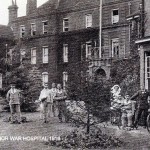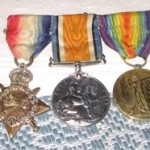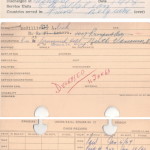

| Personal Details | |
| Date of Birth | July 6, 1887 |
| Place of Birth | Forres, Morayshire |
| Country | Scotland |
| Marital Status | Single |
| Next of Kin | John McGillivray (father), High St., Forres, Morrayshire, Scotland |
| Trade / Calling | Tailor |
| Religion | Presbyterian |
| Service Details | |
| Regimental Number | 877 |
| Service Record | Link to Service Record |
| Battalion | 8th Battalion |
| Force | Canadian Expeditionary Force |
| Branch | Canadian Infantry |
| Enlisted / Conscripted | Enlisted |
| Address at Enlistment | Winnipeg, Manitoba |
| Date of Enlistment | September 22, 1914 |
| Age at Enlistment | 27 |
| Theatre of Service | Europe |
| Prisoner of War | No |
| Survived War | Yes |
| Death Details | |
| Date of Death | January 10, 1963 |
| Age at Death | 75 |
| Buried At | Brookside Cemetery, Winnipeg, Manitoba |
| Plot | MLTY 5767 |
McGillivray, Alexander
Alexander McGillivray was born on 06 July 1887 in Forres, Morrayshire, Scotland. His parents were John McGillivray and Margaret Laing. Siblings included John (1883-1916), James (1889-1965), George (1895-1976), and William who died in infancy.
Alex immigrated to Canada in 1907. He arrived in New York aboard the Columbia on 13 July on his way to Sombra, Ontario and his friend William Duncan. Alex was a tailor. At some point he moved west to Winnipeg. While there he joined the 90th Winnipeg Rifles militia unit.
Britain declared war on 4 August 1914 and three days later mobilization orders were issued in Canada. Officers and volunteers were told to enroll with their local militia then proceed to Valcartier, an area about 20 miles northwest of Quebec City that would become the site of a large military camp. Alex traveled there by train. At Valcartier the volunteers underwent training, medical tests and inoculations. Alex’s medical exam on 08 September tells us he was 5’6″ tall with blue eyes and fair hair. He was found fit for overseas service and on 22 September 1914 he enlisted with the 8th Canadian Infantry Battalion, a new unit made up of recruits from Manitoba and northwestern Ontario. He was listed as single and next of kin was his father, John McGillivray of Forres, Scotland. In October the 8th Battalion embarked for England, leaving from Quebec City on the SS Franconia. They were part of a convoy of 32 transport ships protected by a Royal Navy escort because of the danger from German submarines. The convoy arrived safely in Plymouth, England on 14 October.
The 8th Battalion was sent to Salisbury Plain in southern England where they trained for several months. The men were billeted in tents and huts and due to the cold, wet winter weather many of them became sick with severe colds and pneumonia. They were given a period of leave for the holiday season and after another month of training the men were sent to France in February 1915 as part of the 2nd Brigade, 1st Canadian Division. The battalion spent a few weeks in the area between Hazebrouck and Armentières. In early April they were moved north to the Ypres Salient in Belgium and on 19 April they went into the front trenches near Gravenstafel. Chlorine gas was first used by the Germans on a large scale on 22 April 1915 at Gravenstafel Ridge. The following day Alex received a gun shot wound to his right leg and was invalided to England. While recovering in hospital in Cardiff he was placed in the 32nd Reserve Battalion. In June of 1915 he was granted a week long furlough to Forres, Scotland where he had a chance to visit family. By 22 July 1915 Alex was back in France with the 8th Battalion.
Over the next 3-1/2 years the 8th Battalion took part in all the major battles that involved the Canadian Corps, including the Somme Offensive, Vimy Ridge, Hill 70, Passchendaele and the great victories in the Hundred Days Offensive. Alex was sent to Non Commissioned Officer School on 21 December 1915 returning to duty with his unit on 15 January 1916. In March of that year he was promoted to Corporal and then had a seven day leave to England. In April 1916 Alex attended Divisional Grenadier School for a week. In the spring of 1916 the Canadians were in the Ypres Salient, holding the front line between St. Eloi and Hooge. The Battle of Mount Sorrel started on the morning of 2 June with an intense bombardment of the Canadian lines followed by the explosion of underground mines. After the barrage German infantry advanced and captured Mount Sorrel and nearby areas. A counter-attack on 3 June failed and plans were put in place for a second one, this time with more artillery support. The 8th Battalion moved into position on 12 June and the assault began just after midnight. The battle ended on 13 June when most of the lost areas were recaptured but late that day the 8th was ordered to go to Mount Sorrel to relieve two other battalions. They were heavily shelled on the way in and suffered 100 casualties. Artillery fire had destroyed many of the trenches, making them impassable, and for 24 hours no food or water could get through to the men. The Germans continued to shell their position. The battalion was finally relieved late on 14 June and back behind the lines by 2:30 am. Alex was sent to a rest station on 15 June for treatment of pyrexia (fever) until returning to his unit on 21 June.
In the first week of August the 8th battalion was in camp but due to very heavy rains was moved into billets in the town of Les Brebis near Lens. From the War Diary of the 8th battalion – 5 Aug. 1916: ‘ The Boshe shelled the part of the town where the battalion was billeted, 3 of our men being killed and 7 wounded.’ Alex sustained a gunshot wound to his right knee and was taken to #1 Casualty Clearing Station. He was operated on that day and ‘F.B. were taken from the knee.’ Eleven days later he was moved to #7 General Hospital in St. Omens. Alex was invalided to Bethnal Green Military Hospital in England on 8 September, moved to Uxbridge Canadian Convalescent Home on the 20 November, to Epsom Manor War Hospital on 11 December, to 16th Canadian General Hospital on 11 January 1918. By then his knee had ankylosed, meaning it was permanently kept in a slightly flexed position with no movement of the joint. This made walking painful and awkward. Alex was invalided to Canada on 15 April 1918 for further treatment in Winnipeg. He was discharged on 12 June 1918 due to being medically unfit for further service. He had impaired function of his right knee for the rest of his life and walked with a cane.
Alex was awarded two gold bars and three medals – the 1914-1915 Star, the British and the Victory. His service was recognized in the book ‘Morayshire Roll of Honour 1914-18’. Also mentioned in that book is the service of Alex’s three brothers. John and George enlisted with the Seaforth Highlanders, 6th Battalion at Forres, Scotland in October 1915. Pte. John McGillivray #3965 was killed in France at the Battle of Ancre on 15 November 1916. Pte. George McGillivray #37600 served in France and although suffering from shell shock and trench fever during the war returned to Forres. Sgt. James McGillivray #106429 enlisted with the 1st Canadian Mounted Rifles on 31 December 1914 in Yorkton, Saskatchewan where he was working as a saddler. He served in France and was wounded in his hands and legs in 1916. He returned to Canada and lived in Alameda, Saskatchewan.
After his discharge in 1918, Alex remained in Winnipeg. On 22 April 1921 he married Mary Ann Laing. She had just immigrated to Canada from Forres, Scotland. Her passenger list notes that Alex paid her passage and she was coming to marry him. They had two children – Margaret (Mrs. Richard Brian Allen) born in 1922 and Gordon born in 1924. Alex worked as a tailor but jobs were difficult to find during the depression. His wife, Mary died in February 1935. In 1942 he was working in the tailor shop at the RCAF equipment depot on Notre Dame Avenue.
Alex came to Kenora, Ontario in the 1950’s to live with his daughter and her family. A room was built on to the Allen house at Rabbit Lake to accommodate him. He joined the Kenora branch of the Legion. His Legion membership card shows that he also spent time living with his son, Gordon, in North Vancouver before returning to Winnipeg where he resided at the Brunswick Hotel on Main Street.
Alexander McGillivray died on 10 January 1963 at Deer Lodge Hospital in Winnipeg. He is buried in a military plot at Brookside Cemetery, Winnipeg.










